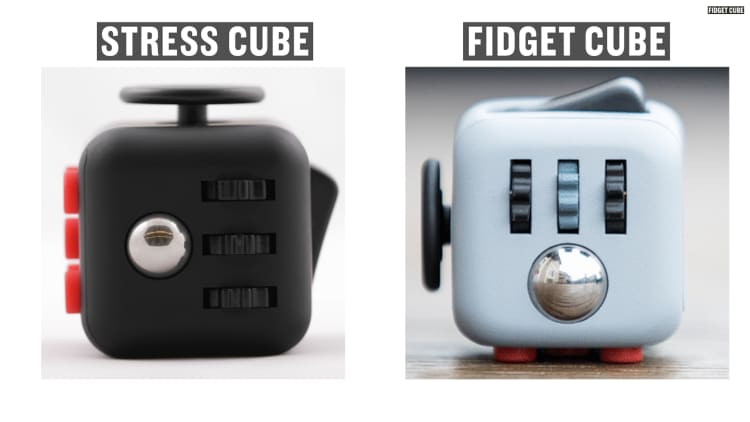If you've spent any time with young people or kids lately, you've probably seen or used a fidget spinner — the airplane-propeller-looking gadget that you can absentmindedly spin while focusing on other tasks.
Love it or hate it, you can thank two 17-year-old high schools students, Allan Maman and Cooper Weiss, for helping create the craze that has annoyed teachers around the country. The company they founded, Fidget360, was among the first to mass produce the toys, making $350,000 in sales in six months, the teens tell CNBC on "Power Lunch."
It started in the fall of 2016, when Maman was searching to buy a product he could fiddle with to help his attention deficit hyperactivity disorder (ADHD). He wanted to buy a fidget cube — a Kickstarter product that has raised over $6 million — but didn't want to wait the months it would take the product to ship.
Then he found a similar product on Etsy, called a fidget spinner. When he noticed that the individual sellers of the spinners were producing them on a small scale with 3-D printers, he had an idea for a business: making and selling the spinners himself.
Maman knew his school, Byram Hills High School in Armonk, N.Y., had 3-D printers, and given that he had experience starting another business (a social media venture called Nito), he thought, "I could probably apply this and mass produce them."
Maman asked his physics teacher for lessons in 3-D printing, found blueprints and teamed up with his friend Weiss, who was also a partner on Nito. The pair created hundreds of spinners with the school's machines within a few weeks, Maman says in a Mic interview.
Although the students clamored to buy them at $25.99 a piece, the administration at the school was unhappy.
"They didn't like the concept of us making a profit off of the school's 3-D printers," says Weiss.
So, the teens took the money they made selling spinners to their classmates and bought their own 3-D printer. They set up shop in Weiss' parents' basement and continued to produce the product, while growing the company's social media presence with influencer marketing, according to Mic. Fidget360's Instagram now has nearly 160,000 followers.
"That is where we drive all of our business from," Weiss tells CNBC.
Though the pair have seen success with Fidget360, the co-founders admit to making one big mistake along the way. Weiss and Maman considered producing the product with injection molding in China, a high volume manufacturing process used to increase scale. But ultimately they decided against it.
Instead, Fidget360 was using a factory in Brooklyn to manufacture the spinners and Maman and Weiss were employing students from school to assemble and package the products back in Weiss' basement, the founders told Mic.
As national interest in fidget spinners surged, bigger companies began to take note of the demand and produce them on a large scale, causing prices to plummet as the toys became widely available. What Fidget360 used to sell for more than $25, they now sell for $4.99. Fidget spinners of all kinds are carried across retailers like Wal-Mart, Target, and at one time topped Amazon's best sellers list.
"If we got the injection molding during that time all of those [sales] would have been ours," Weiss says.
For Weiss and Maman, their misstep isn't slowing down their entrepreneurial ambitions. They tell CNBC their future business plans include "some programs, some apps and then some physical products." That and starting freshman year at college.
Don't miss: This 24-year-old made $345,000 in 2 months by beating Kickstarters to market
Like this story? Like CNBC Make It on Facebook.




